usmbguest5318
Gold Member
Black folks and white folks, for the most part, have very different views of the nature and extent of equality in the U.S. The thing is that while black individuals and white individuals can be correct in evaluating and attesting to one's own situation, and perhaps those of a small few others' situations, it's not possible that on the group level the widely held and broadly asserted states of things as averred by blacks and whites are both correct.
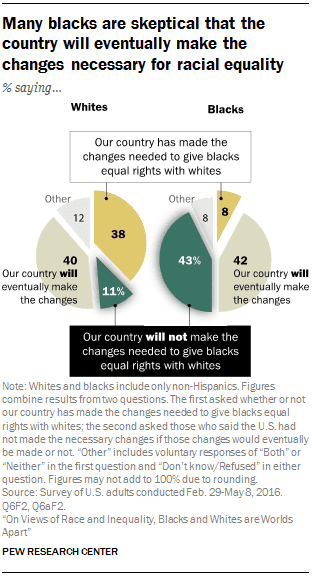
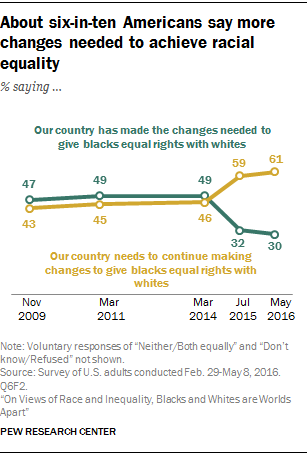
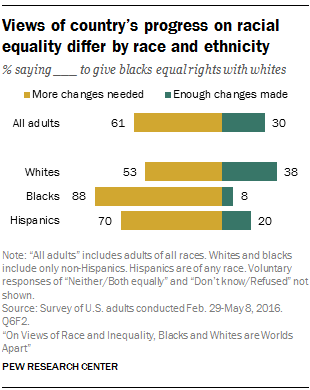
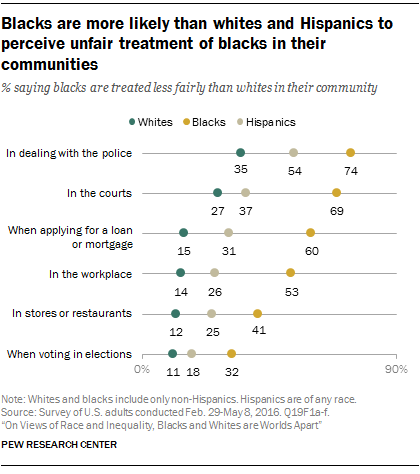
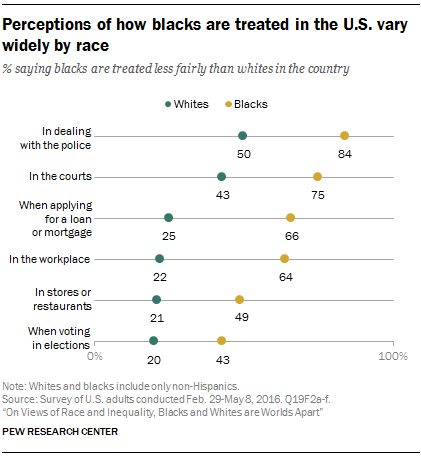
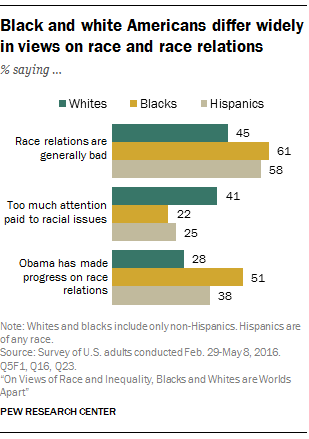
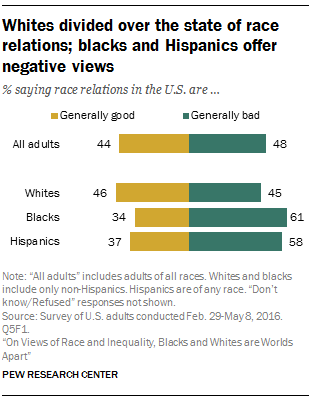
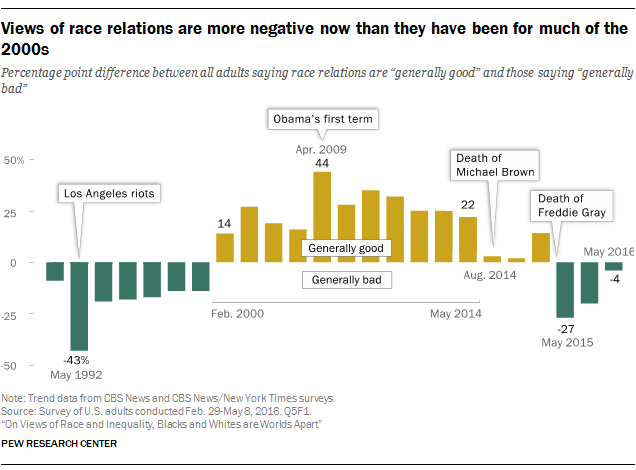
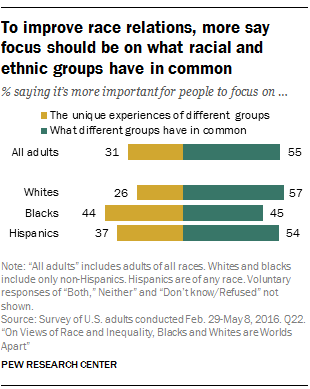
At least young blacks and whites agree on something. Maybe their agreement can lead to things getting better.
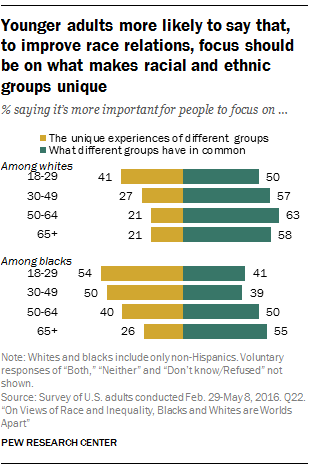
It's no surprise that the folks on the "short end of the race stick" think not enough attention is paid to it. Ditto that folks on the upside of the matter think race gets too much attention. (I included the chart, but I didn't need a study to tell me the below aspect of how the groups generally perceive the matter. LOL)
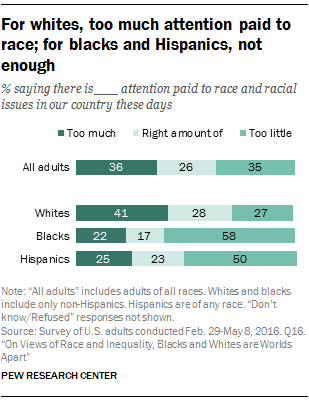
Given how often I see conservatives on USMB (I don't know if they are Republicans) remark on how the Democratic party is the party of racists, I'd have expected to see a smaller percentage of Republicans attesting to the belief shown below.
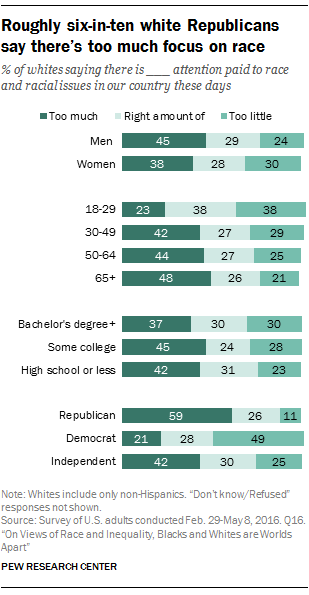
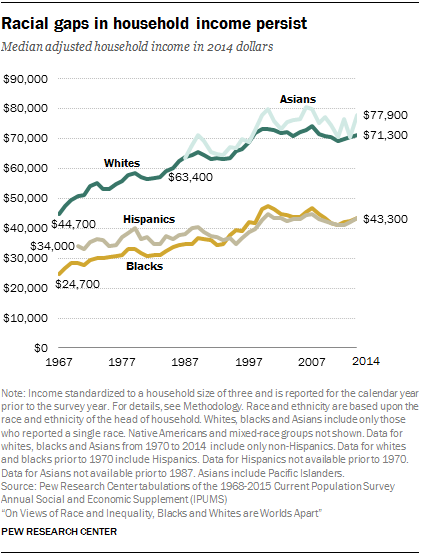
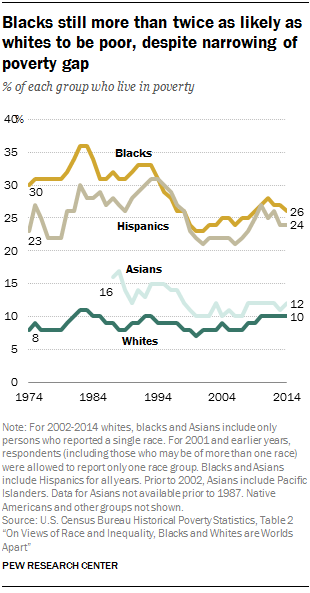
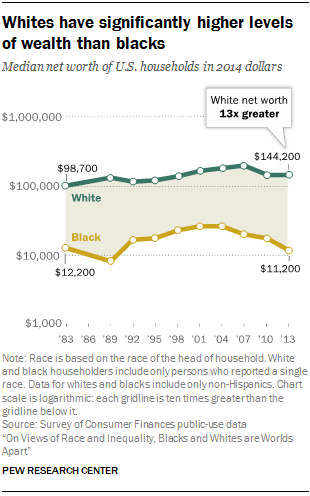
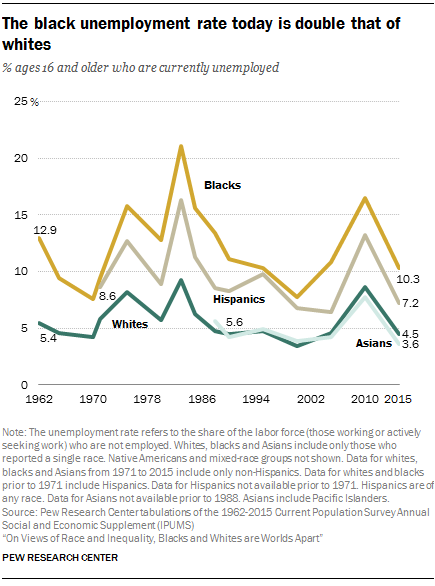
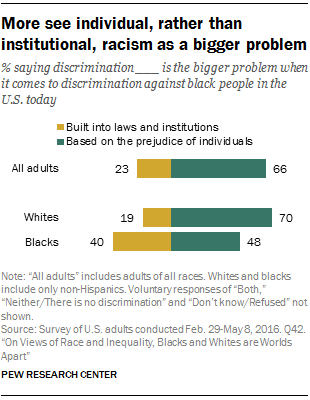
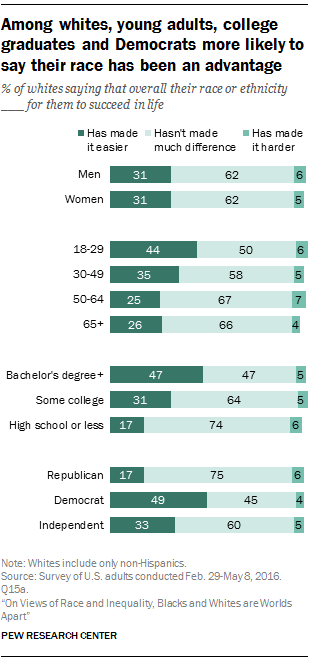
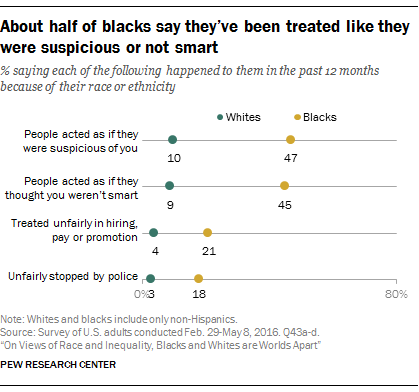
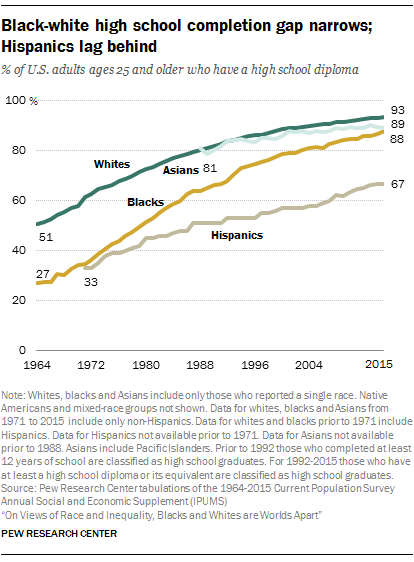
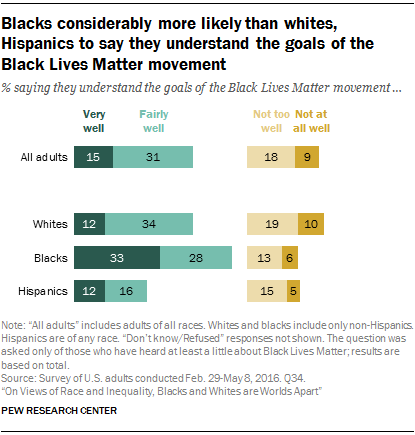
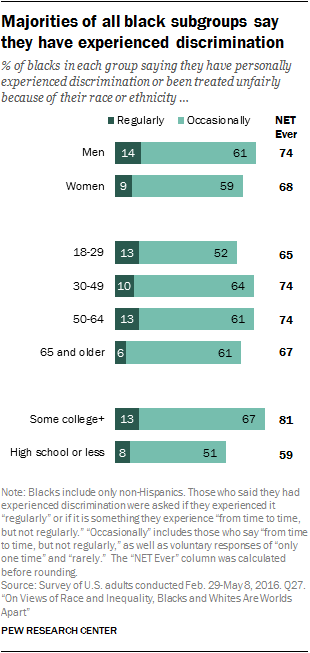
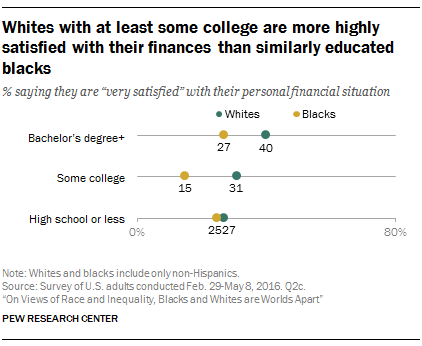
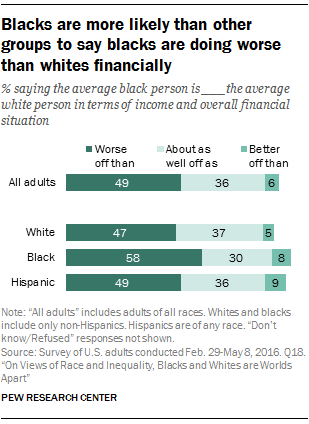
The charts above were taken from a Pew study, "On Views of Race and Inequality, Blacks and Whites Are Worlds Apart." Greater detail on selected questions from the study can be found at "How blacks and whites view the state of race in America."
Why extant is the disconnect between the reality and the perception of equality in the U.S? Part of it has to do with differences in perception of what "equality" means.
For the 1939 World's Fair in New York, the Westinghouse Electric & Manufacturing Co. commissions a one-hour film telling the story of an upper middle class family called the Middletons. The Indiana family visits the fair and is won over by the Westinghouse exhibit's futuristic display of middle-class lifestyle and leisure.
What that means is that whites, as a segment of society in America, took from the early 1600s to about 1950 for the majority of the white population to achieve what is today considered middle class status/lifestyle. In contrast, blacks technically have since the end of segregation (that's the point I specify because separate wasn't ever equal and bigotry and its effects didn't disappear overnight with the passage of the Civil Rights Bill) to the present to, as a segment of society in America, do the same thing. To my mind, it's no wonder that blacks have not "caught up" to whites. That blacks, again as a segment of society, have had to try doing so in the face of greater and lesser degrees of ongoing oppression and disdain for their very being did not ameliorate or expedite their achieving that end. [2]
Causes for the discrepancy in perceptions and reality notwithstanding, the fact is that everyone cannot be correct. Some thoughts that come to mind include:
Notes:
























The charts above were taken from a Pew study, "On Views of Race and Inequality, Blacks and Whites Are Worlds Apart." Greater detail on selected questions from the study can be found at "How blacks and whites view the state of race in America."
Why extant is the disconnect between the reality and the perception of equality in the U.S? Part of it has to do with differences in perception of what "equality" means.
- Among the blacks with whom I regularly speak, equality means equality of opportunity, but not necessarily equality of all outcomes. That is, in some genres, congruity of outcomes should exist across races and genders, whereas for other genres congruity of outcomes need not be existential.
For example, my black colleagues would say that when selecting and or interviewing candidates for a job in the firm:- The firm should make the job availability known to potentially qualified candidates of any and all races, which is particularly relevant for our campus (grad and undergrad) recruiting initiatives as that's where most of our "career track" recruiting happens.
Accordingly, in addition to holding recruitment/interviewing events at "the usual suspects" of schools, we also hold them at HBUs that have strong programs in the disciplines we seek as well as liaising with minority student groups, like Alpha Kappa Mu and Onyx, at "mainstream" colleges and universities.
The example above constitutes what my black associates consider examples of providing comparable opportunity. I'm okay with this notion of comparability of opportunity because all I really want is high performing employees who, with regard to our performance matrix, consistently meet and exceed expectations. - The individuals who interview should be asked comparable questions and have the merit of their responses weighed with a high degree of parity.
The firm achieves that by using a "team" interview process whereby all our interview teams have multiple minorities and women on them. A typical team, five or six people, has two or three women and minority representation of black, Latino and Asian. (Obviously, certain interviewers "kill two birds.")
My black associates would say that as for who gets offers, the outcome, the candidates who performed best should get the offers. That may or may not result in minorities receiving offers, and if it doesn't, that's okay so long as when the minorities do interview well, their being minorities doesn't become a reason they don't get offers. While the minority partners in the firm would like to see more minorities join the firm, they are well aware that, absent huge changes beyond the firm's control, there will always be more whites in the firm.
This example illustrates what my black peers would consider a situation in which an observed difference in outcome is not necessarily a concern they or the firm need to alter. They'd say it may be or may not be, and that more information is needed to know which is so. I don't see their position as unreasonable.
- The firm should make the job availability known to potentially qualified candidates of any and all races, which is particularly relevant for our campus (grad and undergrad) recruiting initiatives as that's where most of our "career track" recruiting happens.
- Among the whites I routinely talk to, equality of opportunity, in their minds, is substantively consistent across races and genders, but equality of outcomes is not. Some whites I've talked to -- not members of the firm -- see equality of outcomes the same way as my black associates do, and some of them see it as "if a white person is qualified and doesn't get an offer yet a minority person does, something unfair happened."
I don't know why they think that. (I truly don't because when folks head down that road with me, I just say "okay" and extricate myself from the conversation.) It's as though they imagine that we might give an offer to a minority who isn't qualified and withhold an offer from the white person because they're white. I guess they just can't fathom that the firm's objective is to hire the best people it can-- as opposed to achieving some sort of predefined racial distribution among it workforce -- because that's what advances its profit motive.
There're, however, no two ways about it: the firm exists to make money, not to hire women, minorities, or whatever. Every decision comes down to whether it is this the "optimal business decision" that we can make given the information we have at the time. That's hiring, firing, promotions, training and career development initiatives, client/engagement selection, where to locate our offices, etc. It's not about anybody feeling good because we have X-many women or minorities. We feel good when we and our people do our jobs well, get well paid, and in our time off, enjoy the fruits of having been well paid.
For the 1939 World's Fair in New York, the Westinghouse Electric & Manufacturing Co. commissions a one-hour film telling the story of an upper middle class family called the Middletons. The Indiana family visits the fair and is won over by the Westinghouse exhibit's futuristic display of middle-class lifestyle and leisure.
What that means is that whites, as a segment of society in America, took from the early 1600s to about 1950 for the majority of the white population to achieve what is today considered middle class status/lifestyle. In contrast, blacks technically have since the end of segregation (that's the point I specify because separate wasn't ever equal and bigotry and its effects didn't disappear overnight with the passage of the Civil Rights Bill) to the present to, as a segment of society in America, do the same thing. To my mind, it's no wonder that blacks have not "caught up" to whites. That blacks, again as a segment of society, have had to try doing so in the face of greater and lesser degrees of ongoing oppression and disdain for their very being did not ameliorate or expedite their achieving that end. [2]
Causes for the discrepancy in perceptions and reality notwithstanding, the fact is that everyone cannot be correct. Some thoughts that come to mind include:
- It's hard to imagine that people who have 200+ years of history being the objects of discrimination (and worse) are also unable to accurately tell when they are a current object of it. They for sure have far more practice being able to tell than do I. By the same token, whites have had a lot of practice at obfuscating the discriminatory nature of their behavior. (There's also the "PC" thing, which, to my mind serves mostly as a "how to" guide for "pricks" who do not want to seem bigoted, sexist, etc.)
- When an individual says they were discriminated against and I wasn't present to see it, unless I have good reason to think they lie and fabricate things at the rate and extent Trump does, I don't have any basis by which to tell them they are wrong. I think one must give people credit for knowing when they've been personally discriminated against. At some point, information may come about that shows the error of their interpretation of the matter, but until that data becomes evident, they deserve to be believed.
- When an individual says they didn't do/say what they said because of their awareness of another's minority status, absent my being there to see the events, I have to believe them. At some point, information may come about that shows the error of their depiction of the matter, but until that data becomes evident, they deserve to be believed.
Notes:
- Of course, there were and are always people with incomes "in the middle." That's a fact of how a range of number work. .
-- The Great Compression
-- Breaking News, Analysis, Politics, Blogs, News Photos, Video, Tech Reviews - TIME.com
-- American Incomes 1774-1860
-- Family Life, 19th-Century Families
-- Poverty - I know someone will myopically feel obliged to bring up Asians. (I swear, sometimes I wonder what bigots would do without Asians.) I'd buy that to a point, but what folks who mention the Asian phenomenon ignore is that racial disdain in the U.S. has largely been skin-color-based, and Asians, for the most part, don't have brown skin. They're largely fair skinned like white folks are.
In light of my having included a wage chart that includes Latinos, it's worth noting that the preponderance of non-white Latinos entering the U.S. came after enactment of the Civil Rights Act. That should come as no surprise. Prior to that, quite simply, it wasn't good to be "brown" in America. It should come as no great shock that Latino wages and black wages are about the same. They've, as "brown" people, substantively had about the same period of time to "catch up."